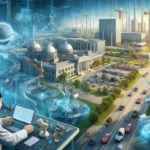We are at the dawn of a new era in biology, like major tech revolutions of the past. This shift in biotechnology could transform how we tackle diseases, produce food, generate energy, and even combat climate change. Imagine a world where our everyday materials, food, and medicine are created using biological processes.
Key Advances in Biotech
In the last year alone, we’ve seen some significant developments:
- The U.S. gave the green light for selling meat grown in labs.
- AI developed by Google DeepMind predicted the structure of millions of new materials.
- The first gene-editing treatment using CRISPR technology was approved.
These advances show just how much potential there is in biotech. Like the digital revolution before it, biotech is poised to overhaul our economy and it’s picking up speed, aided by AI.
AI and Biotech: A Powerful Combo
AI is revolutionizing biotech by allowing us to manipulate biological processes with the precision we program computers. AI can now design new proteins, forecast cancer development, and more, using data from biological sequences. This means we can simulate and predict the outcomes of countless biological experiments quickly and accurately, speeding up discoveries dramatically.
The Risks and Rewards
As with any major technology, biotech carries risks. For example, it’s crucial that the U.S. ensures a reliable supply chain for biotech, from raw materials to data handling, to prevent other countries from gaining access to sensitive genetic information. The President has made moves to block the sale of sensitive data to ensure our national security.
Investing in the Future
To maintain leadership in biotech, the U.S. needs to invest in both the people and infrastructure that will drive this field forward. Government funding and private investment are both vital. Today, the bioeconomy is already a significant part of our GDP, and its potential is enormous. Biotech could soon provide most of the physical inputs for the global economy.
Setting Standards
As the use of AI in biotech grows, we need to set up safeguards to prevent misuse. While AI can design new biological agents, actual risks are controlled because creating pathogens requires specific facilities and knowledge, which are hard to get. Nevertheless, the increasing ease of access to AI in biotech means we must stay vigilant and proactive in biosecurity.
The Impact on Everyday Life
Biotech is not just about big industry changes. It’s likely that you’ve already eaten, worn, or used something made through biotech. This technology will soon touch every aspect of our lives—from new ways to treat infertility and slow aging to biocomputers of the future.
We are on the edge of biotech’s “ChatGPT moment,” where rapid innovation meets widespread application. It’s an exciting time to influence how this technology develops and to ensure it’s done responsibly and beneficially.
















